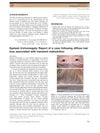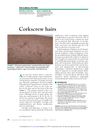 7 citations,
May 2016 in “SpringerPlus”
7 citations,
May 2016 in “SpringerPlus” Some breast cancer patients on hormone therapy experience hair loss, and treatments like certain topical inhibitors and supplements may help without harming their cancer prognosis.
 8 citations,
April 2015 in “Expert Review of Gastroenterology & Hepatology”
8 citations,
April 2015 in “Expert Review of Gastroenterology & Hepatology” Effective symptom management in IBD improves quality of life and prevents complications.
 29 citations,
October 2012 in “Anais Brasileiros De Dermatologia”
29 citations,
October 2012 in “Anais Brasileiros De Dermatologia” Diagnosing hair loss disorders needs clinical, dermoscopic, and histological differences, and checking menstrual cycle, weight changes, drug therapy, and nail changes.
 June 2023 in “Journal of Ayurvedic and herbal medicine”
June 2023 in “Journal of Ayurvedic and herbal medicine” Pumpkin seeds may improve health due to their rich nutrients and potential to treat various conditions.
 2 citations,
October 2021 in “Journal of skin and stem cell”
2 citations,
October 2021 in “Journal of skin and stem cell” Nail disorders are often related to jobs like housework and manual labor, with cosmetic issues being the main concern, and are commonly caused by skin diseases like psoriasis.
 40 citations,
June 2009 in “Journal of Cutaneous Pathology”
40 citations,
June 2009 in “Journal of Cutaneous Pathology” AGA patients have fewer hairs and smaller follicles; T:V ratio above 4:1 may indicate AGA.
 1 citations,
January 2021 in “Turkish Journal of Medical Sciences”
1 citations,
January 2021 in “Turkish Journal of Medical Sciences” Women with telogen effluvium should be tested first for vitamin and mineral deficiencies.
 October 2024 in “INTERNATIONAL JOURNAL OF SCIENTIFIC RESEARCH”
October 2024 in “INTERNATIONAL JOURNAL OF SCIENTIFIC RESEARCH” Trichoscopy can help diagnose Vitamin B12, Vitamin D3, and ferritin deficiencies without blood tests.
 January 2022 in “Journal of Skin and Stem Cell”
January 2022 in “Journal of Skin and Stem Cell” Trichodynia is a painful scalp condition needing targeted treatments beyond symptom management.
July 2020 in “International journal of clinical & experimental dermatology” Hair loss in women aged 20-30 is often linked to deficiencies in Vitamin D, zinc, ferritin, and haemoglobin, as well as low SHBG levels in those with irregular periods.
 2 citations,
September 2012 in “Turk Dermatoloji Dergisi”
2 citations,
September 2012 in “Turk Dermatoloji Dergisi” Low levels of ferritin and vitamin B12 are common in women with telogen effluvium, but the link between nutrient deficiencies and the condition is not clear.
21 citations,
January 2009 in “Indian journal of dermatology, venereology, and leprology” Vitamin B12, folate, ferritin, and iron levels are not linked to alopecia areata.
7 citations,
July 2020 in “Dermatologic therapy” Premature graying of hair is linked to various health issues and can sometimes be reversed by treating underlying conditions.
20 citations,
January 2016 in “International journal of trichology” Young Indians with premature graying often have lower levels of certain nutrients and unhealthy lifestyles.
 10 citations,
January 2012 in “International Journal of Trichology”
10 citations,
January 2012 in “International Journal of Trichology” The study found no link between anxiety, vitamin B12, folate, TSH, ferritin, zinc levels, and trichodynia in telogen alopecia patients.
 1 citations,
January 2021 in “International journal of pharmaceutical research”
1 citations,
January 2021 in “International journal of pharmaceutical research” Low levels of ferritin, TSH, and certain vitamins are linked to hair loss in women of different ages.
 4 citations,
July 2013 in “Journal of dermatology”
4 citations,
July 2013 in “Journal of dermatology” Malnutrition can cause unusual eyelash growth and hair loss.
 July 2020 in “مجله كليه طب الكندي”
July 2020 in “مجله كليه طب الكندي” Low iron levels and obesity are linked to chronic hair loss in women.
 July 2021 in “British Journal of Dermatology”
July 2021 in “British Journal of Dermatology” Low testosterone levels may contribute to female pattern hair loss in men.
 83 citations,
April 1992 in “Clinical Endocrinology”
83 citations,
April 1992 in “Clinical Endocrinology” Having enough iron improves the effectiveness of a specific hair loss treatment in women.
 January 2024 in “Biomedicines”
January 2024 in “Biomedicines” Using stem cells from hair follicles to treat female hair loss is safe and effective after six months.
 3 citations,
April 2015 in “Cleveland Clinic Journal of Medicine”
3 citations,
April 2015 in “Cleveland Clinic Journal of Medicine” The woman has scurvy and needs more vitamin C.
 April 2017 in “InTech eBooks”
April 2017 in “InTech eBooks” Many people with hair loss experience scalp pain known as trichodynia, but the causes are unclear and treatments vary.
2 citations,
January 2018 in “Indian Journal of Psychiatry/Indian journal of psychiatry” Methylphenidate can cause hair loss, which stops when the drug is discontinued.
 37 citations,
January 2009 in “Dermatology”
37 citations,
January 2009 in “Dermatology” Healthy women tend to lose more hair in July and April, and the least in February.
 4 citations,
May 2004 in “Facial Plastic Surgery Clinics of North America”
4 citations,
May 2004 in “Facial Plastic Surgery Clinics of North America” Hair transplantation helps women with hair loss; understanding and empathy lead to happy patients.

Onabotulinumtoxin-A effectively treated a painful scalp condition when other treatments failed.
 June 2018 in “Advances in Cosmetic Surgery”
June 2018 in “Advances in Cosmetic Surgery” Hair loss caused by genetics and hormones; more research needed for treatments.
October 2022 in “Cosmoderma”  October 2023 in “Pediatric dermatology”
October 2023 in “Pediatric dermatology” Middle Eastern patients with epidermolysis bullosa show specific genetic mutations linked to different types of the disease.























